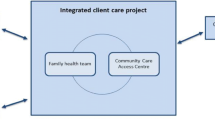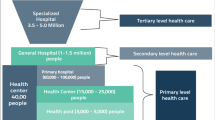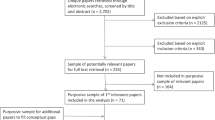Abstract
Knowledge Translation (KT) is a growing movement in clinical and health services research, aimed to help make research more relevant and to move research into practice and policy. This paper examines the conventional model of policy change presented in KT and assesses its applicability for increasing the impact of urban health research on urban health policy. In general, KT conceptualizes research utilization in terms of the technical implementation of scientific findings, on the part of individual decision-makers who can be “targeted” for a KT intervention, in a context that is absent of political interests. However, complex urban health problems and interventions infrequently resemble this single decision, single decision-maker model posited by KT. In order to clarify the conditions under which urban health research is more likely or not to have an influence on public policy development, we propose to supplement the conventional model with three concepts drawn from the social science: policy stages, policy networks, and a discourse analysis approach for theorizing power in policy-making.
Similar content being viewed by others
References
CSDH (2008). Closing the gap in a generation: Health equity through action on the social determinants of health. Final report of the Commission on Social Determinants of Health. Geneva, World Health Organization. Available at: http://www.who.int/social_determinants/en/. Accessed on: November 10, 2008.
Green LW, Glasgow RE, Atkins D, Stange K. Making evidence from research more relevant, useful, and actionable in policy, program planning, and practice: Slips “twixt cup and lip”. Am J Prev Med. 2009; 37(6S1). doi:10.1016/j.amepre.2009.08.017.
Lomas J. Using ‘linkage and exchange’ to move research into policy at a Canadian foundation. Heal Aff. 2000; 19(3): 236–240.
Huis A, Schoonhoven L, Grol R, Borm G, Adang E, Hulscher, et al. Helping hands: a cluster randomised trial to evaluate the effectiveness of two different strategies for promoting hand hygiene in hospital nurses. Implement Sci. 2011; 6: 101. doi:10.1186/1748-5908-6-101.
WHO 2005 World Health Organization (2005). Bridging the "Know-Do" gap: meeting on knowledge translation in global health.
Strauss SE, Richardson WS, Glasziou P, Haynes RB. Evidence‐based medicine: How to practice and teach EBM. 4th Ed. Churchill Livingstone: Edinburgh; 2010.
Sackett DL, Rosenberg WMC, Gray JAM, Haynes RB, Richardson WS. Evidence based medicine: what it is and what it isn’t. BMJ. 1996; 312(7023): 71–72.
Lavis J, Ross S, McLeod C, Gildiner A. Measuring the impact of health research. J Health Serv Res Policy. 2003; 8(3): 165–170.
Canadian Health Services Research Foundation. Knowledge Exchange and the Production of Research. Available at: http://www.chsrf.ca/PublicationsAndResources/ResourcesForResearchers/KEYS/ProductionOfResearch.aspx. Accessed on: December 7, 2011.
Straus S, Tetroe J, Graham I, eds. Knowledge Translation in Health Care: Moving from Evidence to Practice. Oxford: Wiley‐Blackwell/BMJ; 2009.
Lemieux-Charles L, Champagne F, eds. Using Knowledge and Evidence in Health Care: Multidisciplinary Perspectives. Toronto: University of Toronto Press; 2004.
Grimshaw JM, Eccles MP. Is evidence-based implementation of evidence-based care possible? Med J Aust. 2004; 180(6 Suppl): S50–S51.
Dunn JR. Housing and inequalities in health: a study of socioeconomic dimensions of housing and self reported health from a survey of Vancouver residents. J Epidemiol Community Health. 2002; 56(9): 671–681.
Leone R, Carroll BW. Decentralisation and devolution in Canadian social housing policy. Environ Plann C Govt Policy. 2010; 28(3): 389–404.
Fafard P. Evidence and Healthy Public Policy: Insights from Health and Political Sciences. Montreal: National Collaborating Centre for Healthy Public Policy; Canadian Policy Research Networks; 2008.
Soroka SN. Agenda-Setting Dynamics in Canada. Vancouver: UBC Press; 2002.
Kingdon JW. Agendas, alternaves, and public policies (2nd ed.). New York: Longman; 1995.
Deleon P. The stages approach to the policy process: what has it done? Where is it going? In: Theories of the Policy Process. Boulder, CO: Westview Press; 1999: 19–34.
Mitton C, Adair CE, McKenzie E, Patten SB, Perry BW. Knowledge transfer and exchange: review and synthesis of the literature. Milbank Q. 2007; 85(4): 729–768.
Ouimet M, Landry R, Amara N, Belkhodja O. What factors induce health care decision-makers to use clinical guidelines? Evidence from provincial health ministries, regional health authorities and hospitals in Canada. Soc Sci Med. 2006; 62(4): 964–976.
Lomas J, Fulop N, Gagnon D, Allen P. On being a good listener: setting priorities for applied health services research. Milbank Q. 2003; 81(3): 363–388.
Lomas J. Health services research. BMJ. 2003; 327(7427): 1301–1302.
Rhodes RAW. Policy network analysis. In: The Oxford Handbook of Public Policy. New York: Oxford; 2006: 425–447.
Howlett M, Ramesh M, Perl A. Studying Public Policy: Policy Cycles & Policy Subsystems. 3rd ed. Toronto: Oxford University Press Canada; 2009.
Exworthy M. Policy to tackle the social determinants of health: using conceptual models to understand the policy process. Health Policy Plann. 2008; 23(5): 318–327.
McGarity TO, Wagner WE. Bending Science: How Special Interests Corrupt Public Health Research. Cambridge: Harvard University Press; 2008.
Entman RM. Framing: toward clarification of a fractured paradigm. J Commun. 1993; 43(4): 51–58.
Dorfman L, Wallack L, Woodruff K. More than a message: framing public health advocacy to change corporate practices. Health Educ Behav. 2005; 32(3): 320–336. discussion 355–362.
Gagnon MI. Moving knowledge to action through dissemination and exchange. J Clin Epidemiol. 2009; 64(1): 25–31.
Bevir M, Rhodes R. Governance Stories. London: Routledge; 2006.
Fafard P. Public health understandings of policy and power: lessons from INSITE. J Urban Health. 2012; doi:10.1007/s11524-012-9698-2.
Chapman S. Advocacy in public health: roles and challenges. Int J Epidemiol. 2001; 30: 1226–1232.
Greenhalgh T, Wieringa S. Is it time to drop the ‘knowledge translation’ metaphor? A critical literature review. J R Soc Med. 2011; 104(12): 501–509.
Acknowledgements
This work has been funded in part by the Canadian Institutes of Health Research (CIHR) under grant #101693, entitled “ Power, Politics, and the Use of Health Equity Research.”
Author information
Authors and Affiliations
Corresponding author
Rights and permissions
About this article
Cite this article
Murphy, K., Fafard, P. Taking Power, Politics, and Policy Problems Seriously. J Urban Health 89, 723–732 (2012). https://doi.org/10.1007/s11524-012-9694-6
Published:
Issue Date:
DOI: https://doi.org/10.1007/s11524-012-9694-6




